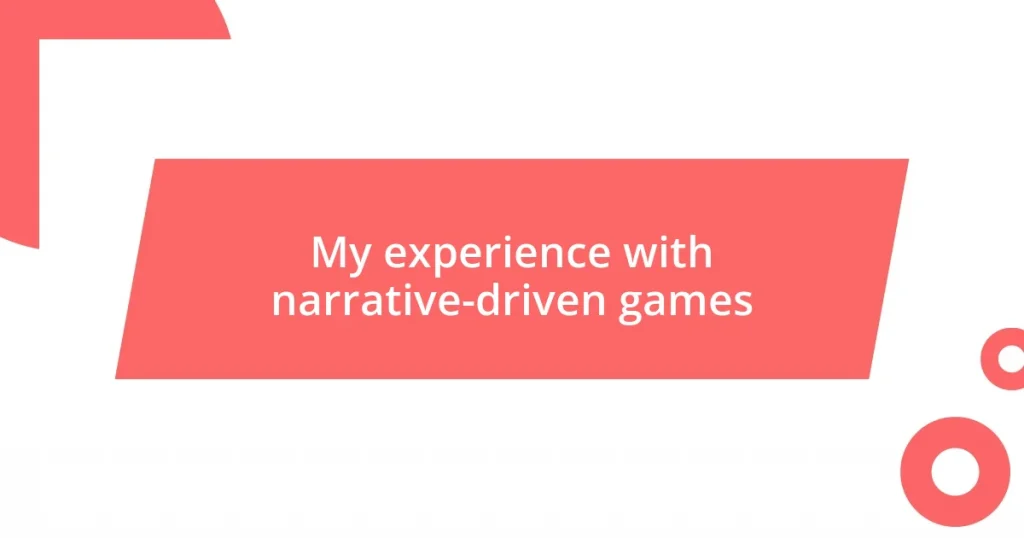Key takeaways:
- Narrative-driven games foster deep emotional connections through impactful storytelling, allowing players to reflect on their own experiences and moral choices.
- Games like “The Last of Us” and “Life is Strange” exemplify how character development and the weight of choices can lead to profound engagement and empathy towards fictional lives.
- Exploring diverse perspectives and embracing unpredictability in narratives encourages players to appreciate real-life complexities, enhancing their understanding of empathy and emotional depth.
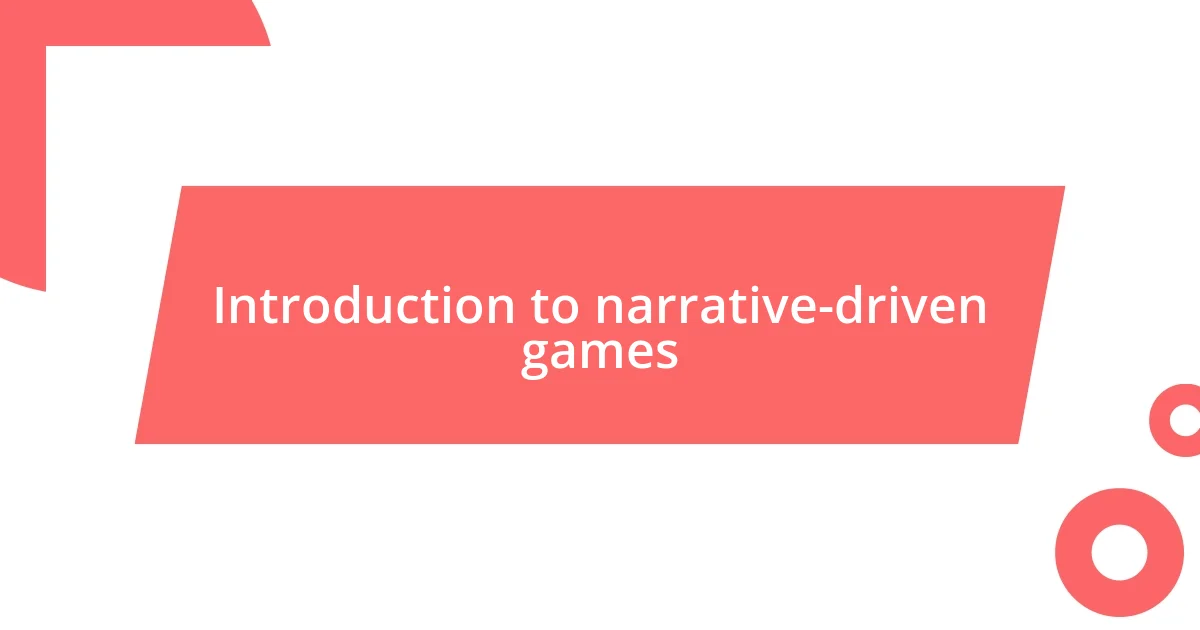
Introduction to narrative-driven games
Narrative-driven games are truly a remarkable fusion of storytelling and interactivity. I remember my first encounter with one; it was like stepping into a book where I could influence the plot. The choice I made felt incredibly personal, making me wonder how my decisions mirrored my own life experiences.
These games often create emotional connections that traditional media can struggle to achieve. For instance, in one game, I found myself emotionally invested in a character’s journey, feeling their triumphs and failures as if they were my own. It made me reflect: how can a simple choice shape a story in ways we never imagined?
At their core, narrative-driven games invite players to engage deeply with their characters and choices. I love pondering how these experiences can shift our perspectives and evoke empathy. Isn’t it fascinating how a game can cultivate such rich emotional landscapes while allowing us to explore our narratives through the lens of another’s life?
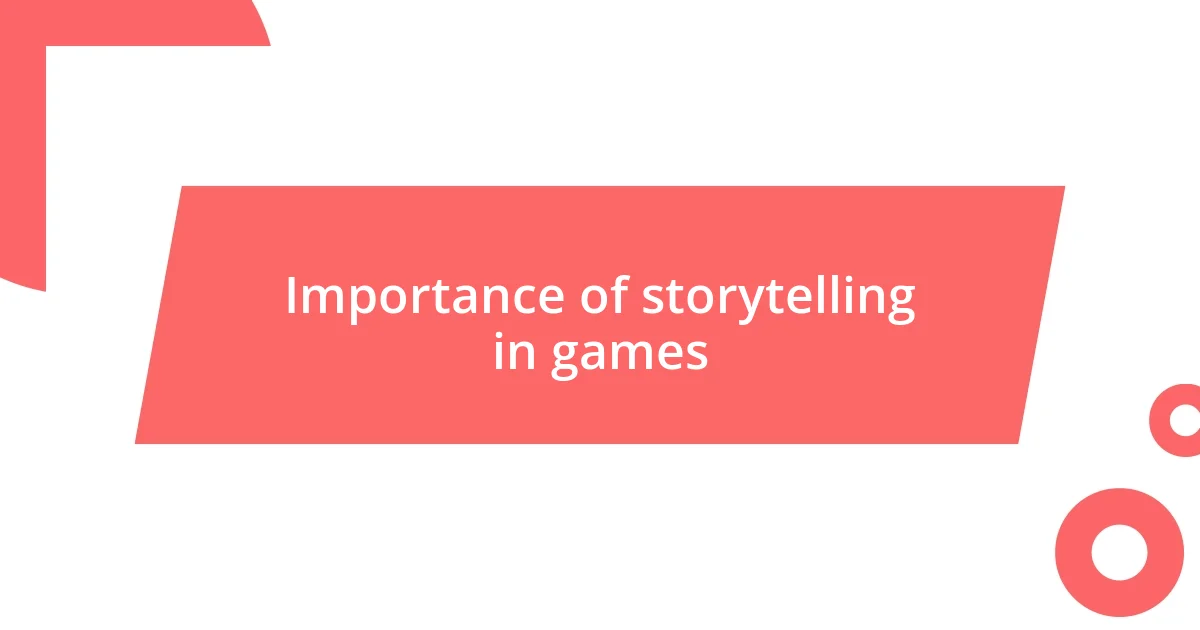
Importance of storytelling in games
The significance of storytelling in games cannot be overstated. From my experience, a well-crafted narrative transforms gameplay into a profound emotional journey. I recall a specific moment in a game where my decision to betray a friend led to heartbreaking consequences. It was more than just a plot twist; it brought forth a wave of guilt and reflection that lingered long after I put the controller down.
In addition to crafting a compelling narrative, storytelling in games enhances player engagement. I’ve noticed that when games invest time in developing rich backstories for characters, it creates a sense of connection. For instance, in a game I recently played, learning about a character’s past struggles made their triumphs feel even more meaningful. It’s as if the games are teaching us empathy by allowing us to step into someone else’s shoes.
Furthermore, these narratives often serve as a vehicle for exploring complex themes. Take, for example, a game that delves into ethical dilemmas. While playing, I found myself grappling with moral questions that related to real-world issues. It sparked lively discussions with friends about right and wrong, demonstrating that storytelling in games holds the power to foster discourse and reflection in ways that other mediums might not achieve.
| Aspect | Significance |
|---|---|
| Emotional Engagement | Players experience genuine reactions to character arcs |
| Character Connections | Backstories foster empathy, making players care about outcomes |
| Complex Themes | Games challenge players to reflect on real-world issues |
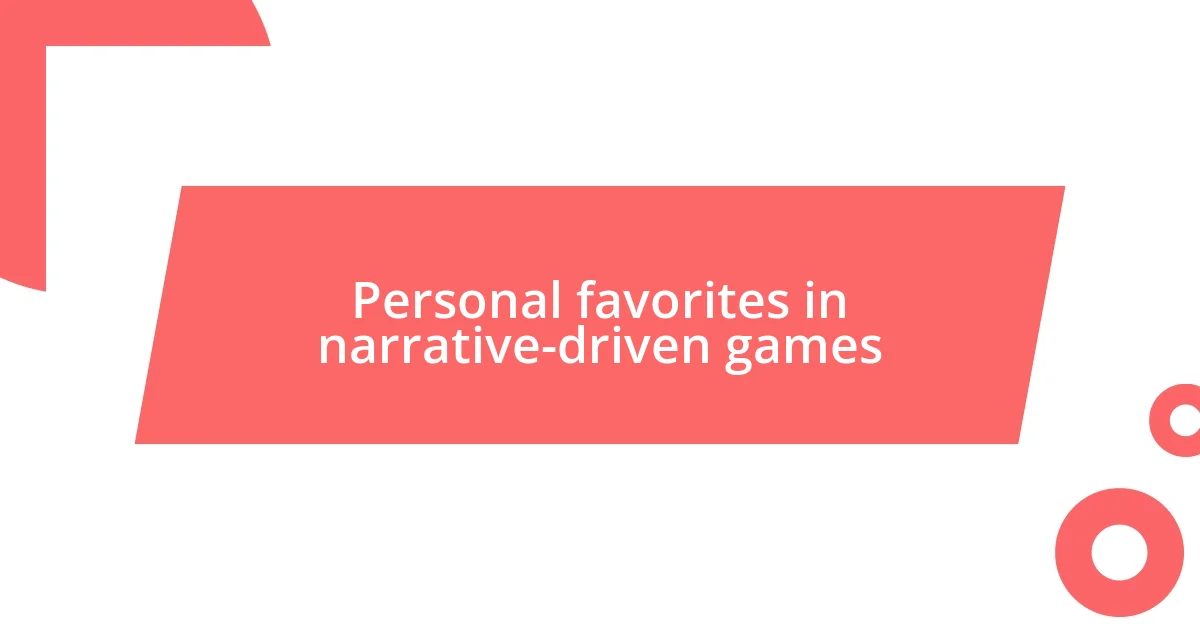
Personal favorites in narrative-driven games
One game that truly captivated me was “The Last of Us.” The emotional depth of the characters, particularly Joel and Ellie, resonated deeply. I felt their bond grow, and when faced with life-altering decisions, each choice weighed heavily on my heart, offering a rich exploration of love, loss, and survival that stayed with me long after the credits rolled.
Here are some of my personal favorites in the realm of narrative-driven games:
- Life is Strange: I cherish the time-bending mechanics that accentuate the weight of choices. Each rewind made me rethink the consequences of my actions.
- Firewatch: The stunning visuals paired with heartfelt dialogue made me reflect on connection and isolation. I still think about the conversations and how they mirror real-life struggles.
- Oxenfree: This indie gem’s unique dialogue system crafted a narrative that felt real and evocative, pulling me into its supernatural mysteries with every line.
- Detroit: Become Human: The branching narratives and moral dilemmas forced me to confront my beliefs about humanity and technology, leading to some intense debates with friends post-playthrough.
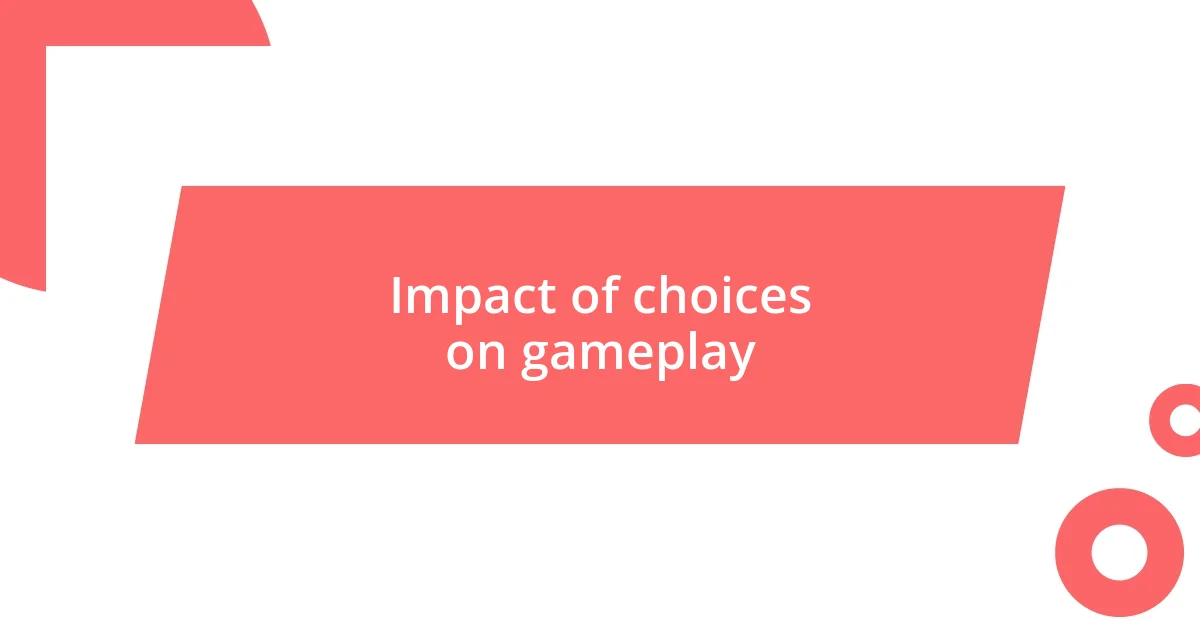
Impact of choices on gameplay
Making choices in narrative-driven games can completely alter the experience, and I’ve seen this firsthand. I’ll never forget the moment in The Walking Dead when I had to choose whether to save a friend or a stranger. The aftermath of that decision haunted me, not just because of the immediate impact but because it made me question my values. It’s intriguing how a single choice can ripple outwards, altering character arcs, relationships, and even the story’s outcome.
As I progressed through Mass Effect, I discovered how varied my journey could be based on the choices I made early on. The build-up to the final battle had me feeling a mix of anxiety and excitement because I genuinely cared about the characters I had either saved or sacrificed. I often wondered: how would it feel to revisit these choices with a different mindset? Understanding the nuanced effects of decision-making made each playthrough an exploration of not just the game’s world, but of my own moral compass.
There’s something powerful about recognizing that our choices matter within a game. In Until Dawn, every option felt like a weighty decision, and my friends and I would often debate the best course of action before a pivotal moment. It felt like we were all a part of the story, shaping it together. I realized that this collaborative thought process added a layer of enjoyment that I didn’t expect. Seeing how others reacted to the same choices made me appreciate the game’s design even more, as it highlighted just how dramatically our play styles can diverge based on personal values.
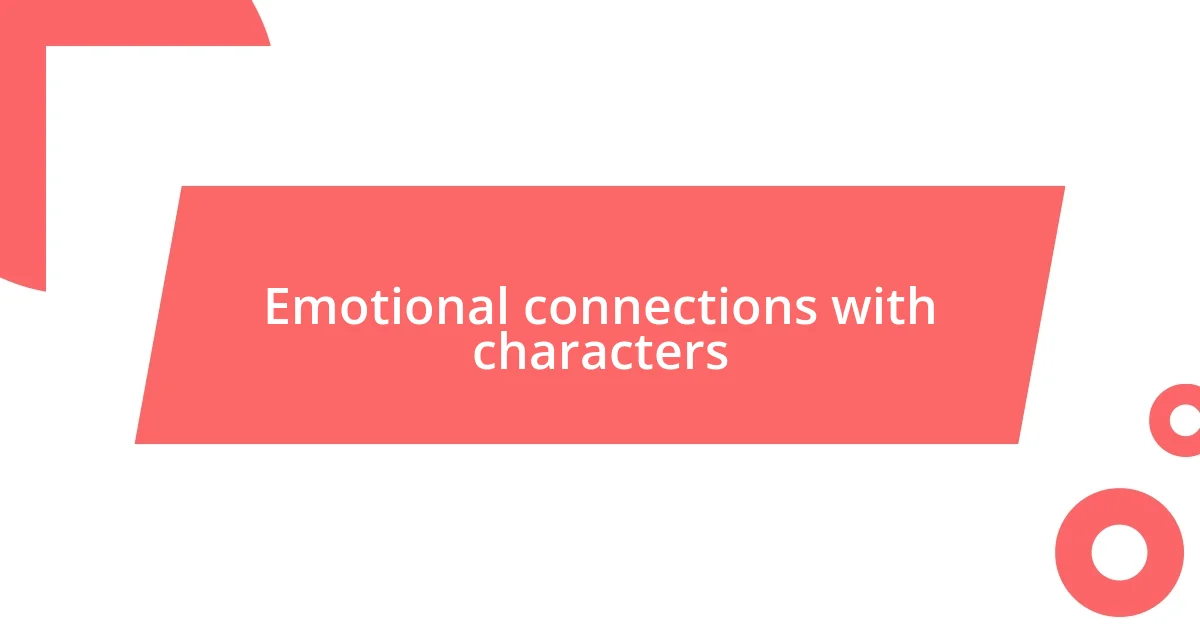
Emotional connections with characters
Engaging with characters in narrative-driven games can evoke particularly strong emotional reactions, like the one I experienced with Life is Strange. When I watched Max make difficult choices that affected Chloe, I felt a visceral connection to their friendship. Those moments made me reflect on my own relationships—could I be as courageous in the face of adversity? This sense of relatability often pulls me deeper into the story, making it hard to tear myself away from the screen.
There’s a certain magic in witnessing character growth, isn’t there? In Firewatch, I remember the first time Henry opened up about his struggles. It hit me hard, as it mirrored some of my own emotions during tough times. That moment encouraged me to think about how we all carry burdens, often hidden from view. Experiencing this vulnerability made me appreciate the humanity within the game, allowing me to forge a bond with Henry despite him being a fictional character.
Sometimes, it’s the sheer unpredictability of a character’s fate that keeps me on edge. For instance, in The Last of Us, when I realized how much I cared for Ellie, it was heart-stopping to see her vulnerable. What if I had to protect her at all costs? This question lingered with me long after my playthrough. The emotional stakes felt so high that I found myself considering what true sacrifice means in both the game and my life. This deep connection is what keeps me returning to narrative-driven games; they expand my understanding of emotion and relationships in profound ways.

Lessons learned from my experiences
The journey through narrative-driven games has taught me the value of empathy in ways I never expected. I vividly recall a moment in Detroit: Become Human when I made a choice that led to a heartbreaking outcome. I had to confront my own biases and preconceptions as I navigated a world where every character had a story and a struggle, reminding me of the real people around me. How often do we overlook the complexities of others’ lives in our day-to-day experiences?
Another lesson I’ve taken to heart is the importance of perspective. In What Remains of Edith Finch, I experienced a variety of life stories through the lens of individual family members. Each narrative was a reminder of how differently people can interpret the same events, and it sparked a sense of curiosity in me. Have you ever thought about how your own experiences shape your view of the world? This game reinforced the idea that embracing diverse perspectives can enrich our understanding and foster compassion.
I’ve also learned to embrace the unpredictability of life and the inevitability of loss. Playing Shadow of the Colossus was a profound realization of this truth, especially during my encounters with the colossi. Each defeat was emotional, resonating with a sense of sacrifice that echoed my own experiences with letting go. It’s fascinating to think: how can we find meaning in our sacrifices? This exploration of loss has instilled in me a deeper appreciation for the beauty and fragility of both in-game narratives and real life.

Recommendations for new players
When diving into narrative-driven games, I highly recommend starting with titles that are known for their storytelling prowess. Games like The Walking Dead instantly immerse players in emotional narratives, making it easier to connect with the characters. I remember my heart racing as I faced decisions that affected the lives of others; it made me realize how impactful my choices can be, both in-game and in life. What better way to learn the craft of narrative than to experience it firsthand?
For new players, take your time to explore the environment and really soak in the details. I found that games like Oxenfree and Gone Home reward curious players with rich stories hidden in the backgrounds. Each object you interact with can unveil deeper layers to the plot, making me feel like a detective piecing together a puzzle. Have you ever paused to reflect on how small details can shape a larger narrative? It’s an engaging way to foster your appreciation for storytelling.
Don’t shy away from engaging with the community around these games. When I joined discussions after playing Mass Effect, I discovered that sharing experiences amplifies the emotional journey. Hearing different viewpoints helped me appreciate nuances in the story, which I may have overlooked during gameplay. Isn’t it interesting how dialogues can enhance our understanding? Connecting with others can turn solitary experiences into shared adventures, introducing you to fresh insights and interpretations.










